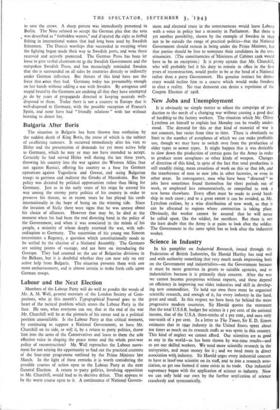New Jobs and Unemployment
It is obviously no simple matter to adjust the campaign of pro- duction to the needs of a changing war without causing a good deal of hardship to the factory workers. The situation which Mr. Oliver Lyttelton set himself to explain last Monday can be readily under- stood. The demand for this or that kind of material of war is not constant, but varies from time to time. There is absolutely no limit to the number of aeroplanes of which we can make 'profitable use, though we may have to switch over from the production of older types to newer types. It might happen that it was desirable to slow down the Production of certain guns for the Army in order to produce more aeroplanes or other kinds of weapon.. Changes of direction of this kind, in spite of the fact that total production is still steadily rising, mean cessations of work on this or that job, and the transference of men to new jobs in other factories, or even in other areas. In consequence, men who have been " directed " to jobs have sometimes found themselves for short periods out of work, or employed less remuneratively, or compelled to seek a new home elsewhere. Every effort must be made to avoid hard- ship in such cases ; and to a great extent it can be avoided, as Mr. Lyttelton realises, by a wise distribution of new work, so that it can be allocated to regions where contraction is taking place. Obviously, the worker cannot be assured that he will never be called upon, like the soldier, for sacrifices. But there is not the least doubt that the Army is at pains to look after the soldier. The Government in the same spirit has to look after the industrial worker.


























 Previous page
Previous page